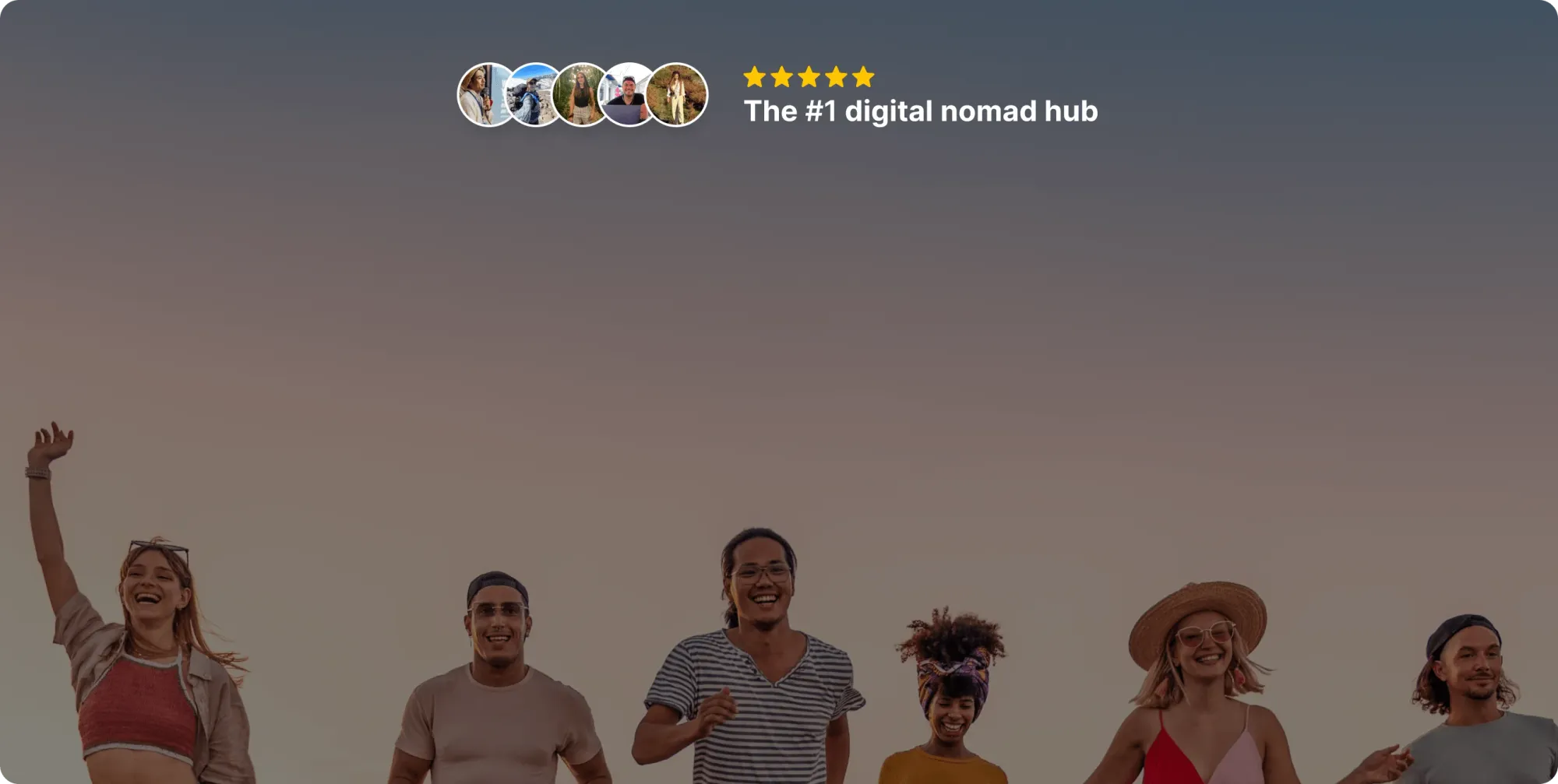Is Being A Digital Nomad Legal?
A clear guide for digital nomads on how to stay legal while working remotely abroad, covering visas, taxes, and compliance tips.


As digital nomads, we’ve got the passport stamps, the portable desk setup, and the flexibility to work from wherever feels right.
But with all that freedom comes one big, often overlooked question: Is this actually legal?
The short answer is... Not always and definitely not everywhere.
The good news is, with a bit of preparation, you can stay compliant, avoid trouble, and keep living the dream.
In this guide, we break down what it actually means to work abroad legally. We’ll walk you through tourist visas, digital nomad visas, tax systems, and common legal pitfalls. Plus tips to stay compliant without sacrificing your lifestyle.
Why the Law Isn’t Always Clear About Digital Nomadism
Most labor and immigration laws were written long before remote work became a thing, leaving digital nomads in a legal grey zone.
What makes things tricky is how we work.
Generally speaking, if you're simply working online, not taking local jobs or starting a business, and just staying longer than the average tourist, it often flies under the radar.
That said, each country interprets the law differently. And while many governments may not actively monitor remote workers, staying compliant is still essential because, in the eyes of the law, ignorance isn’t an excuse.
Can Digital Nomads Work Abroad on a Tourist Visa?
Digital nomads often find themselves dancing a delicate tango in the grey zones of immigration law. Technically, many countries don’t allow any kind of work on a tourist visa, but remote work often slips through the cracks, especially if you’re not earning money locally or engaging with the local job market.
That’s why you’ll often see digital nomads working from laptop-friendly cafés or coworking spaces without any issues. Most are self-employed or working for foreign companies, and as long as they respect visa time limits, authorities tend to look the other way.
Some countries are surprisingly relaxed about it. Here are a few where working remotely on a tourist visa is common:
| Country | Risk Level | Enforcement Examples |
|---|---|---|
| Mexico | Moderate | Officers may issue shorter stays if suspected of frequent border runs; repeat six-month cycles increasingly flagged. |
| Costa Rica | Low to Moderate | Welcoming culture for nomads; fines for overstays; new 1-year nomad visa required by banks for accounts. |
| Malaysia | Low to Moderate | Laptop work largely ignored; border runs common; publicly selling services without DE Rantau pass may trigger investigations. |
| Portugal | Moderate | Remote work with foreign clients tolerated; working for local clients or overstaying can lead to fines. |
On the flip side, some countries take this much more seriously. Immigration rules are stricter, and being caught working on a tourist visa can lead to fines, deportation, or bans. Here are a few places where you should be more cautious:
| Country | Risk Level | Enforcement Examples | Consequences |
|---|---|---|---|
| United States | Very High | Deportation, 5-year bans | Deportation, bans, fines |
| Indonesia | High | Deportation if caught | Deportation, possible fines |
| Thailand | Moderate | Raids on coworking spaces | Detention, questioning, deportation possible |
What Is a Digital Nomad Visa? And When Do You Need One?
Digital nomad visas are becoming a popular solution for remote workers who want to stay longer than the usual 30–90 day tourist trip. More and more countries are offering this type of permit, allowing you to live and work legally abroad, often for 6 to 24 months, depending on the destination.
The best part is you’re no longer stuck in a legal grey zone. With a nomad visa, it’s usually easier to rent a place, open a local bank account, and stay on the right side of tax rules.
Some of the most popular countries offering digital nomad visas include:
If you’re planning to stay longer than a tourist visa allows, it’s usually worth doing the paperwork for a proper nomad visa. Here are a few common requirements you’ll need to meet:
- Minimum income: Most countries ask for proof of a stable remote income. This is typically between $2,000 and $4,500 per month. You’ll need to show that the money comes from foreign clients, employers, or a business registered outside the country.
- Health insurance: Some countries require full international health coverage. For example, Italy asks for a policy that covers at least €30,000 in emergency medical care.
- Clean background & valid passport: You’ll often need a clean criminal record and a passport valid for at least six months.
Paying Taxes as a Digital Nomad
No matter where you're from, taxes will follow you even as a digital nomad. But not every country plays by the same tax rules. In general, there are two main systems:
Tax residency-based
In most countries, you're taxed based on whether you're considered a resident, and that usually depends on:
- Physical presence: You spend more than 183 days in the country.
- Center of vital interests: You have strong personal or economic ties there (like a home, business, or close family).
If either applies, you might be required to file taxes locally, even if your income comes from abroad.
Citizenship-based
A much rarer system, but it’s a big one: countries that tax you just for being a citizen.
The United States is the most well-known case. U.S. citizens are required to file taxes on their worldwide income, no matter where they live. This can lead to double taxation, unless you qualify for exclusions or tax treaties.
Luckily, some countries offer tax systems or incentives that can make life a little easier for nomads. Let’s take a look at a few worth knowing about.
Territorial Tax Countries
These countries only tax income earned within their borders, so foreign-sourced income is exempt.
| Country | Tax Benefits |
|---|---|
| Malaysia | Taxes local income; foreign income taxed if remitted (2022–2026 rule) |
| Panamá | Foreign income exempt |
| Costa Rica | Digital nomad visa; foreign income generally not taxed |
| Uruguay | Visa holders often exempt from tax on foreign income |
Tax-Free Countries
These countries don’t impose personal income taxes at all, local or foreign.
| Country | Tax Benefits |
|---|---|
| UAE (Dubai) | No personal income tax; 1-year digital nomad visa available |
| Bahamas | No income tax; digital nomad residence visa |
| Antigua/Bermuda | 2-year digital nomad visa; no income tax on foreign income |
| Barbados | Welcome Stamp visa; no local taxes on foreign income |
Nomad-Friendly Tax Incentives
Some countries don’t waive taxes entirely, but they do offer generous incentives.
In Greece, for example, if you stay more than 183 days and become a tax resident, you can qualify for a 50% income tax reduction for up to seven years.
Another example is Portugal. Under Portugal’s updated digital nomad visa scheme, if you become a tax resident, you can benefit from a reduced flat income tax rate of 15%, which is significantly lower than the standard progressive rates that go up to 48% for regular residents.
Our general advice is to always use a tax advisor who specializes in digital nomads to avoid double taxation, missed filings, or legal headaches later on.
Common Legal Issues Digital Nomads Face (And How to Avoid Them)
We’ve already talked about the importance of tracking how long you stay in each country. But that’s just one piece of the puzzle. There are a few other legal pitfalls that digital nomads need to keep in mind on every trip:
Overstaying Your Tourist Visa
Overstaying is one of the most common mistakes, and the consequences vary wildly depending on the country:
- Georgia and Mexico are relatively lenient. You’ll just pay a fine when you leave.
- Indonesia, Malaysia, and Thailand issue daily fines that can stack up quickly. And in some cases, lead to deportation or even being blacklisted.
- Serbia, Colombia, and Portugal enforce hefty fines and may deny you re-entry for repeat offenses.
- Costa Rica charges $100 per month for overstays, and if it happens more than twice, they might deny you entry on your next visit.
Working Without the Right Permission
Even if you're just freelancing online, you can’t assume that’s allowed everywhere. Most countries don’t let you work with local clients or offer services without a proper work permit. And yes, that includes seemingly harmless gigs like photography or yoga classes. Always double-check the local labor laws before accepting any kind of paid work.
Tax Confusion and Mistakes
One of the trickier parts of nomad life is figuring out where you owe taxes — and how to stay compliant. It’s easy to fall behind or misreport foreign income, especially if you move around a lot. That’s why it’s worth investing in a tax advisor like Heavnn or SavvyNomad, who understands international taxation for remote workers. It might not be exciting, but it’s the best way to avoid double taxation, penalties, or nasty surprises later.
Tips for Staying Legal and Stress-Free as a Digital Nomad
It’s easy to get caught up in the freedom of the nomad lifestyle, but staying legally compliant is what keeps that freedom sustainable. A bit of planning goes a long way. Here are some key reminders to help you stay out of trouble and focus on what really matters.
- Always research visa options before you go: Visa rules change often, and every country has its own way of managing borders. Don’t assume yesterday’s rules still apply. Always check official government sites before you book your ticket.
- Respect local laws and don’t work for local clients: Tourist visas, and even some digital nomad visas, don’t allow you to work for local businesses. Stick to foreign clients or remote gigs unless you’ve got the proper permit.
- Keep track of your stays and exits: Staying even a few days too long could mean fines, entry bans, or unwanted tax residency.
- Work with a tax advisor who gets the digital nomad life: This isn’t something to DIY. International tax laws are complex, and mistakes can cost you. A professional who understands remote work and cross-border income can save you money and headaches.
- Apply for a digital nomad visa if you’re putting down roots (even temporarily): If you’re planning to stick around longer than your tourist visa allows, it’s time to make it official. A digital nomad visa can give you peace of mind.
Ready to Travel with Confidence?

Join our global
digital nomad community
Join us for free
Freaking Nomads is supported by you. Clicking through our links may earn us a small affiliate commission, and that's what allows us to keep producing free, helpful content. Learn more
Read Next


Are Coworking Spaces Worth It?


VirtualPostMail Review: My Honest, Hands-On Experience


